Irvine McAlister since 1862 | |||||
| Style | His/Her Highness the Lord/Lady President | ||||
| Seat | Palace of Whitehall, London, Commonwealth | ||||
| Appointer | Named by the Lord Protector | ||||
| Term Length | At Lord/Lady Protector's pleasure while commanding the confidence of the majority of the House of Commons. | ||||
| Formation | 1653 | ||||
Let your own discretion be your tutor: suit the action to the word, the word to the action.
(W. Shakespeare, Hamlet, Act III, scene 2, line 18.)
The Commonwealth Council of State is the direct advisory body of the Lord Protector and acts as the executive of the country's government in place of the King and the Privy Council. It directs domestic and foreign policy and ensures the security of the English Commonwealth. Also in a state of war the Lord Protector-in-Council has supreme executive powers.
It was formerly known as the Council of State (1649-1653) and the Protector's Privy Council (1653-1660).
Functions and Role[]
The chief role of the Council of State in brief words is coordinating authorities and advising the Lord Protector in the exercise of his executive powers. The members of the Council (usually 13 to 21) are nominated by the Protector and approved by Parliament.
By custom and convention the Council of State issues: Orders in Council (by Order of the Lord Protector and Council, Lord Protector exercises authority on advice of the Council), Orders of Council (by Order of the Council, secondary legislation drafted by the Council for government regulations and appointments) and the Commonwealth Charters (special status granted to corporations and incorporated bodies). All above mentioned deal with a wide variety of matters and issues.
The Necessity Decrees (ND) issued by the Lord Protector are special emergency executive acts of the Lord Protector and the Council that unless approved by the Parliament in 30 days become null and void. The ND were established under the Emergency Powers Act (1792) due to to the European Revolutionary Wars and renew by later legislation. The ND cannot contradict the Instrument of Government nor the Claim of Rights Act and are subject to judicial review.
Foreign relations are dealt by the Council’s (Foreign) Secretary of State under instructions of the Council and advises the Lord Protector.
The Council of State delegates part of its executive and administrative powers in Scotland and Ireland by means of two separate councils. Its Isle of Mann and Channel Islands Affairs Committee deals with legislation and executive orders of the said territories.
Meetings and Procedures of the State Council[]
The State Council meets at large on a regular basis, usually once or twice a week to discuss the most important issues of government policy, and to make decisions. Its full member meetings are chaired by the Lord President of the Council, with or without the Lord Protector attending them. The State Council has numerous committees which focus on particular areas of government and coordinate their work. There may be permanent committees or ad hoc committees set up for a short duration to look at particular issues.
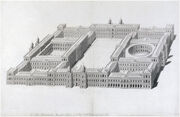
New Palace of Whitehall
The New Palace of Whitehall, with over 1500 rooms, functions as the administrative center of the Council and also has the venue for the state and ceremonial meetings of the Lord Protector. A large staff of secretaries, clerks, courier, archivists,and accountants provide the necessary administrative services. Civilian courtiers that serve as secretaries, advisors or agents of the Protector and Council, are also part of the staff. However, the transactions or matters discussed or verbatim reports of the full sessions of the Council are not available nor published and are kept in secret. To its meetings or committees the Council can invite or demand the assistance of other state officials. It is usual for the Lord Chancellors to attend meetings and the committees when the Council is dealing with constitutional or legal matters.

Somerset House (National Building or Publick Offices)
The National Building or Public Offices, is a large Neoclassical building situated on the south side of the Strand in central London, overlooking the River Thames, just east of Strand Bridge[1]. Somerset House, as it is more commonly called, functions as an accommodation of the various administrative offices and the National Board of Public Works. Also serves as a complementary venue for state and ceremonial meetings or events.
The Committees and Government Bodies[]
Council of State has several permanent and provisional standing and ad hoc committees and commissions, secretaries and ministers that carried out the state and government administration and policies.
The creation, modification and termination of the commissions, secretaries and ministers and government departments is defined by law. The Council Guidance issued by the Lord Protector ranks and defines the senior or junior status of the council members. .
The main permanent ones are the following:
- Treasury commissioners (members named Lords Commissioners of the Commonwealth's Treasury[2])
- Board of Customs
- Board of Excise
- National Estate Board
- Army Council
- Admiralty Committee
- Navy Commission
- Postmaster General of the Commonwealth. Includes the Departments of Posts and Telegraphs, and the Post Office Savings Bank
- Board of Ordnance (merged in the Board of the War Industry and Supplies)
- Commissariat (merged in the Board of the War Industry and Supplies)
- Council for Foreign Plantations (disbanded and part of its functions transferred to the Board of Trade and the Secretary of State for the Colonies)
- Foreign Office
- Committee for the Business of the Law (also known as the Judiciary Committee)
- Committee of Public Peace
- National Board of Works (established as an independent body of the National Estate Board)
- Indian Affairs Department
- Board of Trade (former Council of Trade)
- Secretary of State for the Colonies (Colonial Office)
- Board of the War Industry and Supplies[3] (1799 to date)
- Board of Commissioners for the Affairs of India (1804 to date), replaced the Board of Control (for the administration of British India 1764-1804)
- The Chief Scientific Advisor and the Protector's Office for Science (1801 to date)
- The Minister of the Home Civil Service and the Home Civil Service Commission (1828 to date)
Administration of the Home Countries[]
The Council of State delegates part of its executive and administrative powers in Scotland and Ireland by means of two separate councils and a Committee of the Isle of Mann and Channel Islands.
The Council of State for Scotland with nine members (starting 1655), named by the Council of State and at least half of its members must be Scotsmen. The Lord President chairs the Council. The seat of Council and main government offices are at the Palace of Holyroodhouse (Edinburgh, Scotland). In addition to ensuring the continuance of the Union and the establishment of good government, the Council were directed to encourage the preaching of the Gospel; encourage the growth of Universities and schools; purge the burghs of disaffected magistrates; administer justice; to approximate the judicial system to that of England; encourage trade and foster the revenue. Important measures of the Council are the ones that allowed The burghs to elect their own magistrates and Justice of the Peace courts were set up in all of Scotland.
The Irish Council of State (or Irish Council) with six members and the Lord Lieutenant of Ireland (named by the Protector-in-Council) administers the island. The seat of Council and main government offices are at Dublin Castle.
The Isle of Mann and Channel Islands Affairs Committee deals with legislation and executive orders of the said territories.
Lord President[]
The role of the President of the Council of State (usually addressed as "Lord President") was originally intended to simply preside over the Council of State. However, its role became more powerful as successive Acts of Parliament delegated to it the power to issue ordinances and designations with the approval of the Lord Protector. Initially these acts provided the means to administer all overseas dominions, colonies and territories.
By convention the Lord President has always being member of the House of Commons. From 1651 to 1658 Parliament had limited the chair of the Council to one month.
| Portrait | Name (Born-Died) |
Mandate (Start-End) |
Political affinity/faction/party |
Commonwealth Parliament Legislature |
|---|---|---|---|---|
| Henry Lawrence[4] (1600 - 1664) |
Dec. 1653 - Nov. 1658 | Cromwellian | 1st (1654-1655), 2nd (1656-1656) | |
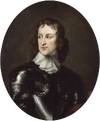 |
John Lambert (1619 - 1685) |
Nov.. 1658 - July 1672 | Cromwellian | 3rd (1659-1662), 4th (1662-1665), 5th (1665-1668), 6th (1668-1672) |
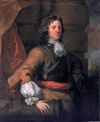 |
Lord Edward Montagu 1st Earl of Sandwich (1619 - 1687) |
July 1672 - March 1678 | Cromwellian (Civil/Court party) | 7th (1672-1677), 8th (1677-1682) |
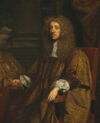 |
Anthony Ashley-Cooper 1st Earl of Shaftesbury (1621 - 1695) |
March 1678 - 1682 | Cromwellian (Civil/Court party) | 8th (1677-1682) |
| Overhauled finances and treasury. Established the practice that only the State Council could initiate money bills in Parliament. | ||||
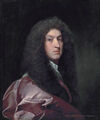 |
William Russell, Lord Russell (1639 - 1703) |
1682-1687 | Whig | 9th (1682-1687) |
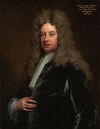 |
John Somers, 1st Baron Somers (1651 - 1716) |
1687-1691 | Whig | 9th (1682-1687), 10th (1687-1692) |
 |
James Scott, 1st Duke of Monmouth (1649 - 1718) |
1691-1695 | Moderate Whig | 10th (1687-1692), 11th (1692-1697) |
 |
John Churchill, 1st Duke of Marlborough (1650-1722) |
1695 - 1700 | Moderate Whig | 11th (1692-1697) |
 |
William Penn the Younger (the Old Radical) (1644 - 1718) |
1700 -1703 | Dissident Whig | 12th (1697-1702), 13th (1702-1703), 14th (1703-1708) |
| Usually at odds with Protector Scott. Under his presidency the Council promoted and secured the passage and approval of the Claim of Rights Act (1702) after he secured a majority in the elections of 1702. Dismissed a week later after the returns of the early elections of House of Commons. | ||||
 |
Charles Montagu, 1st Earl of Halifax (1661 - 1715) |
1703 - 1706 | Whig Junto | 14th (1703-1708) |
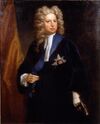 |
Robert Harley, 1st Earl of Oxford and Earl Mortimer (1661 - 1724) |
1706 - 1708 | Tory and Country-Whig Coalition | 14th (1703-1708) |
| First conservative presidency and majority in the Council of State after gaining a partial working supplies and legislative majority in elections of 1703. | ||||
 |
William Penn the Younger (The Old Radical) (1644 - 1718) |
1708 -1712 | Dissident Whig | 15th (1708-1712), 16th (1712-1717) |
| Despite mutual animosity between Penn and Protector Scott, he was called to the presidency of State Council after elections of 1708 gave Whigs a majority. Dismissed two months after elections of 1712 when Whig Junto voted down his Presidency under Protector Scott's clout. | ||||
 |
Charles Talbot, 1st Duke of Shrewsbury (1660 - 1730) |
1712-1722 | Whig Junto | 16th (1712-1717), 17th (1717-1722) |
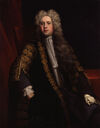 |
Sir William Wyndham, 3rd Baronet (1688–1740) |
1722-1724 | Tory | 18th (1722-1727) |
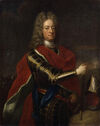 |
James Butler, 2nd Duke of Ormonde (1665–1745) |
1724-1730 | Irish Whig | 18th (1722-1727), 19th (1727-1732) |
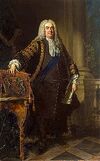 |
Robert Walpole, 1st Earl of Orford (1676–1745) |
1730-1743 | Whig | 19th (1727-1732), 20th (1732-1737), 21th (1737-1743) |
 |
Henry Pelham (1694–1754) |
1743-1754 | Whig | 22th (1743-1748), 23th (1748-1753), 24th (1753-1759) |
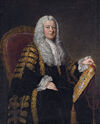 |
Philip Yorke, 1st Earl of Hardwicke, (1690–1764) |
1754-1759 | Whig | 24th (1753-1758) |
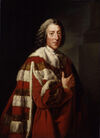 |
William Pitt, 1st Earl of Chatham, (1708–1778) |
1759-1763 | Patriot Whig --> Patriot Party | 25th (1758-1763) |
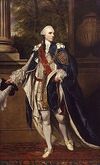 |
John Stuart, 3rd Earl of Bute, (1713–1792) |
1763-1768 | Tory-Country Coalition | 26th (1763-1768) |
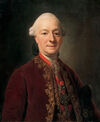 |
Alexander Cromwell, (1726–1796) |
1768-1769 | Patriot | 27th (1768-1773) |
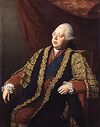 |
Frederick North, 2nd Earl of Guilford, (1732–1792) |
1769-1778 | Tory-Country Coalition | 27th (1768-1773) 28th (1773-1778) |
 |
Alexander Cromwell, (1726–1796) |
1778-1788 | Radical Reformer --> Radical Alliance | 29th (1778-1783) 30th (1783-1788) |
| Passed the Representation of the People Act of 1780 that expanded franchise and made wide changes in polling. Gave limited female suffrage in England, Ireland and Scotland. | ||||
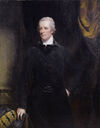 |
William Pitt the Younger, (1759–1806) |
1788-1806 | National Reform PU -> National Unity Coalition (National Reform and Radicals) 1803 | 31th (1788-1793) 32th (1793-1798) 33th (1798-1803) 34th (1803-1806) |
| The natural leader of the country under Protectors Leveson-Gower and Spencer during the European Revolutionary Wars. Enacted several reforms and brought British India under direct rule. The Council of All Talents (1797-1806) and later the National Unity Coalition were his most successful moves to unite the country at War. | ||||
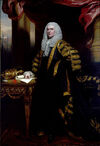 |
Henry Addington, 1st Viscount Sidmouth, (1757–1844) |
1806-1806 | National Unity Coalition (National Reform and Radicals) | 34th (1803-1806) |
| Fall of the Council of All Talents (1797-1806) the day after news of the North Sea Disaster and the withdrawal of Protector Spencer's confidence -despite Addington enjoying a majority in the House- that triggered immediate House elections and the Grand Court Martial for the Disaster (1806). | ||||
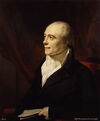 |
Spencer Perceval, (1762–1835) |
1806-1816 | National Unity Coalition (National Reform and Radicals) => National and Civic Fusion[5] | 34th (1803-1806) 35th (1806-1811) 36th (1811-1816) |
| Led victory of European Revolutionary Wars. Reformed Army and Navy commissions with the help of Protector Spencer influence and patronage. One of the founders of the National and Civil Fusion. Retired in 1816 after securing the position of his successor in the following elections. | ||||
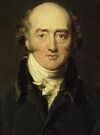 |
Isaiah Bloxham, (1764-1829) |
1816-1823 | National and Civic Fusion | 37th (1816-1821) 38th (1821-1823) |
| Reinstablishemt of relations with France under the guidance of Lord Protector FitzPatrick between 1820-1822. | ||||
 |
Horace Marcus Gardiner, (1778-1854) |
1823-1835 | Radical Progressive PU | 39th (1823-1828) 40th (1828-1833) 41th (1833-1838) |
| Local Government Electoral Reform Act (1824) and London Metropolitan Police District (1830). Women were named in government positions (1825) and all women given the same franchise qualifications (vote and be elected) as men in 1831. | ||||
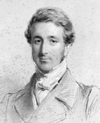 |
Lovell Prichard, (1776-1840) |
1835-1839 | Radical Progressive PU | 41th (1833-1838) 42th (1838-1843) |
| Repeatedly ill in 1839 State Council business was managed by his deputy Hunter Hilbert and party leadership by Lady Glenda Marvin. Minority government in 1838. Government fell after a vote of no confidence on the London Government Bill. | ||||
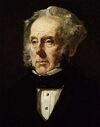 |
Lord Philip Cox (1795–1870) |
1839-1841 | Civic PU | 42th (1838-1843) |
| Minority Civic and National Constitutional government (1839-1841) sustained by Protector Yates. | ||||
 |
Mathilda Triggs (1798-1854) |
1841-1848 | National Constitutional PU | 42th (1838-1843) 43th (1843-1848) |
| First Lady President of the State Council. Minority Civic and National Constitutional government (1841-1843) sustained by Protector Yates. | ||||
 |
Irvine McAlister | 1848-1854 | National Constitutional PU | 44th (1848-1853) 45th (1853-1854) |
| Former Lord President of Scotland (1846-1848). | ||||
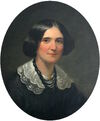 |
Lady Susan Vance-Marvin | 1854-1862 | Radical Progressive PU, later People's Welfare PU. | 46th (1854-1859) 47th (1859-1862) |
| First leader of the People's Welfare PU, split from the Radical Progressive in 1860. | ||||
 |
Irvine McAlister | 1862-... | National Constitutional PU | 48th (1862-1867) |
| Former Lord President of Scotland (1846-1848). | ||||
| |||||||||||||||||||||||
- ↑ OTL Waterloo Bridge
- ↑ Usually shorten to Lords of the Treasury.
- ↑ Established from the War Supplies Committee (1793-1799) that coordinate the activities of the Board of Ordnance, Commissariat and the War Standing Committee of the Board of Trade.
- ↑ Lord President of the Protector's Privy Council
- ↑ At local elections it supports the Municipal Reform Political Union


